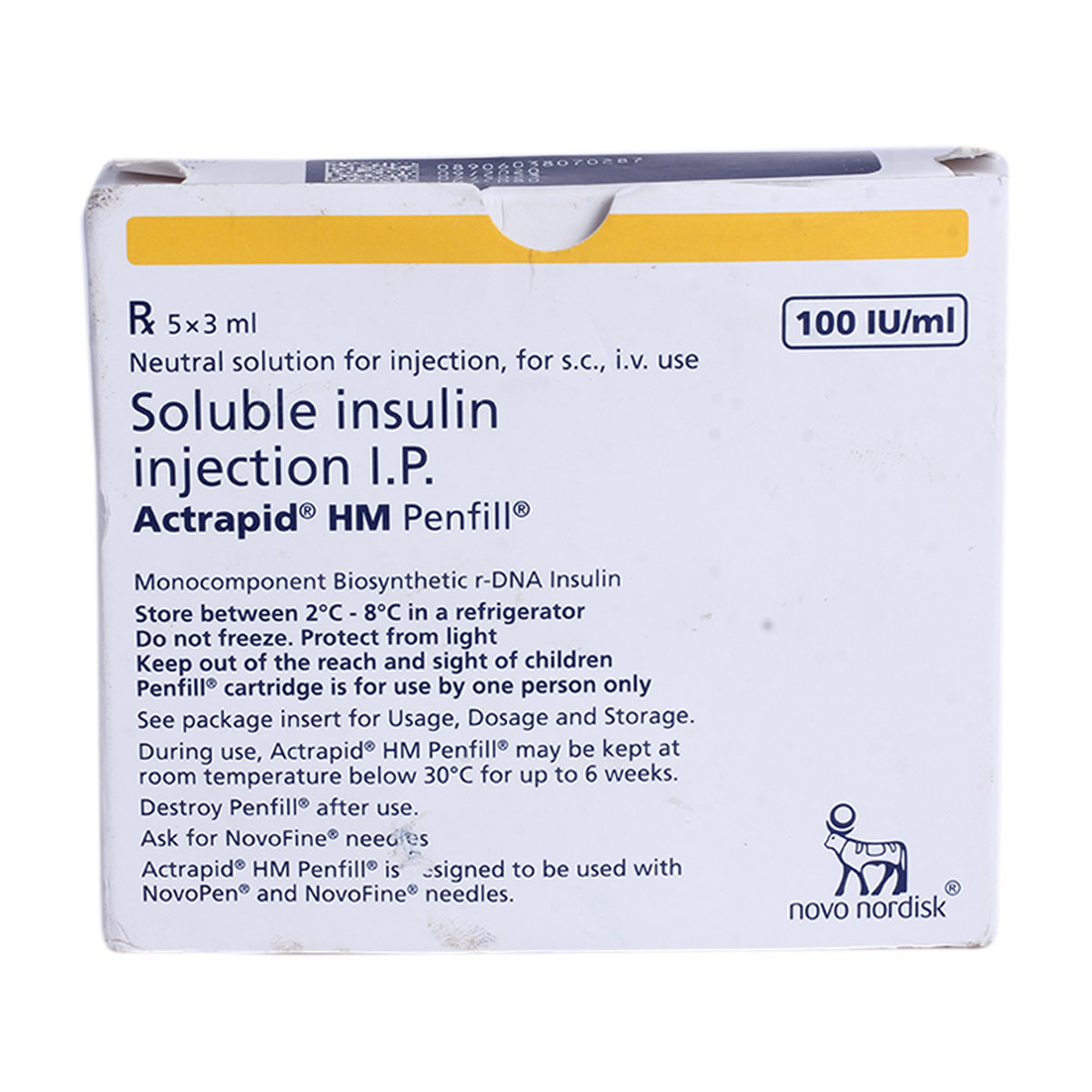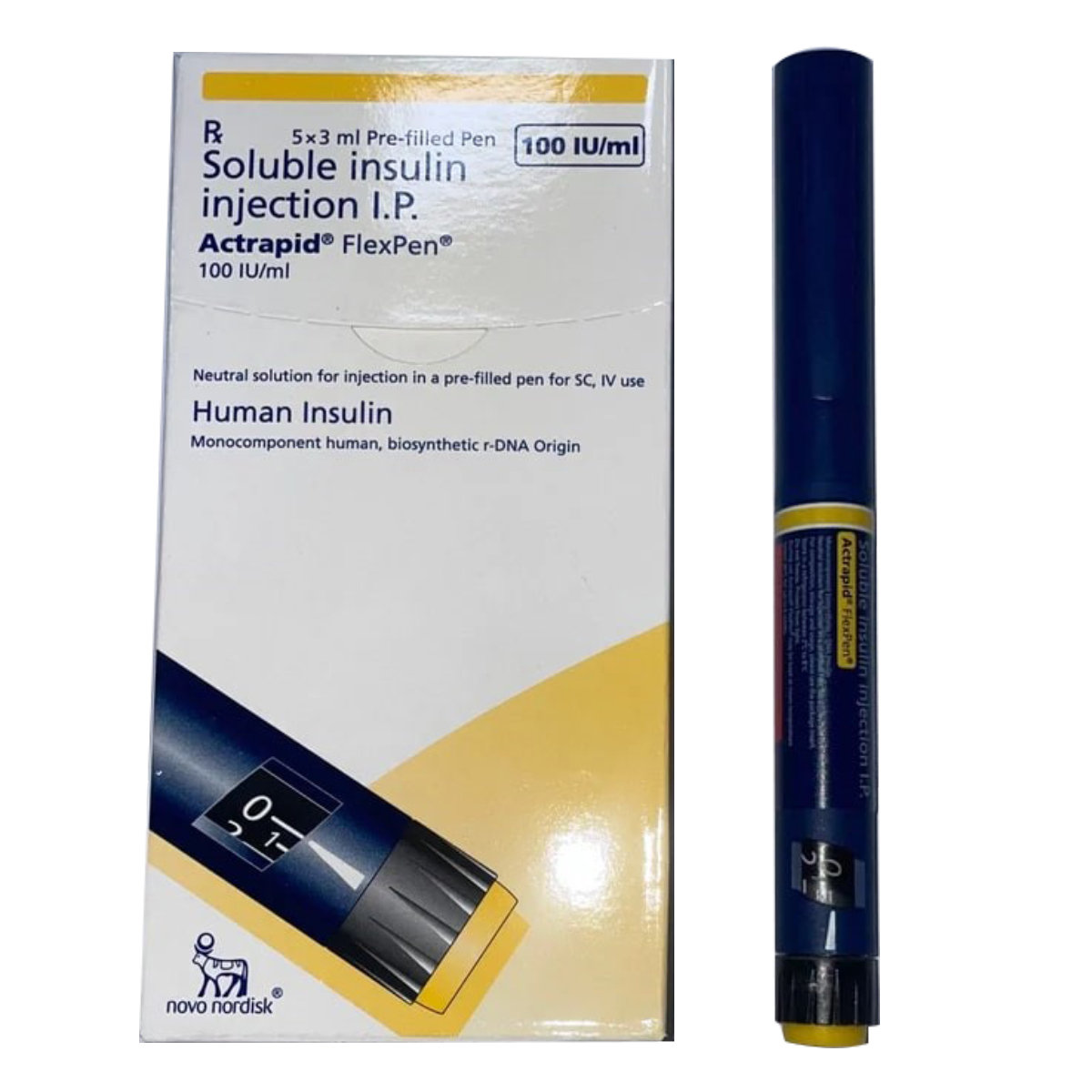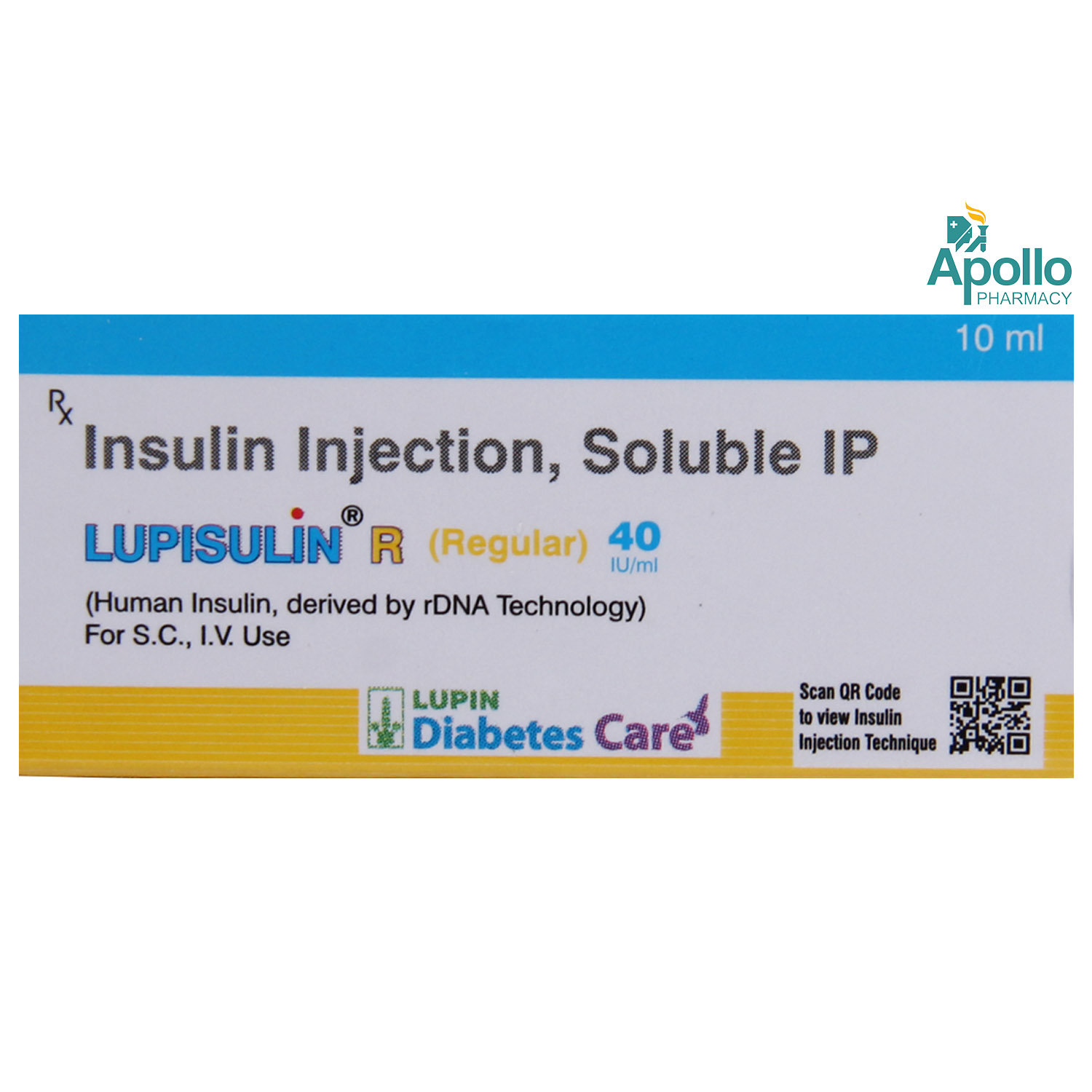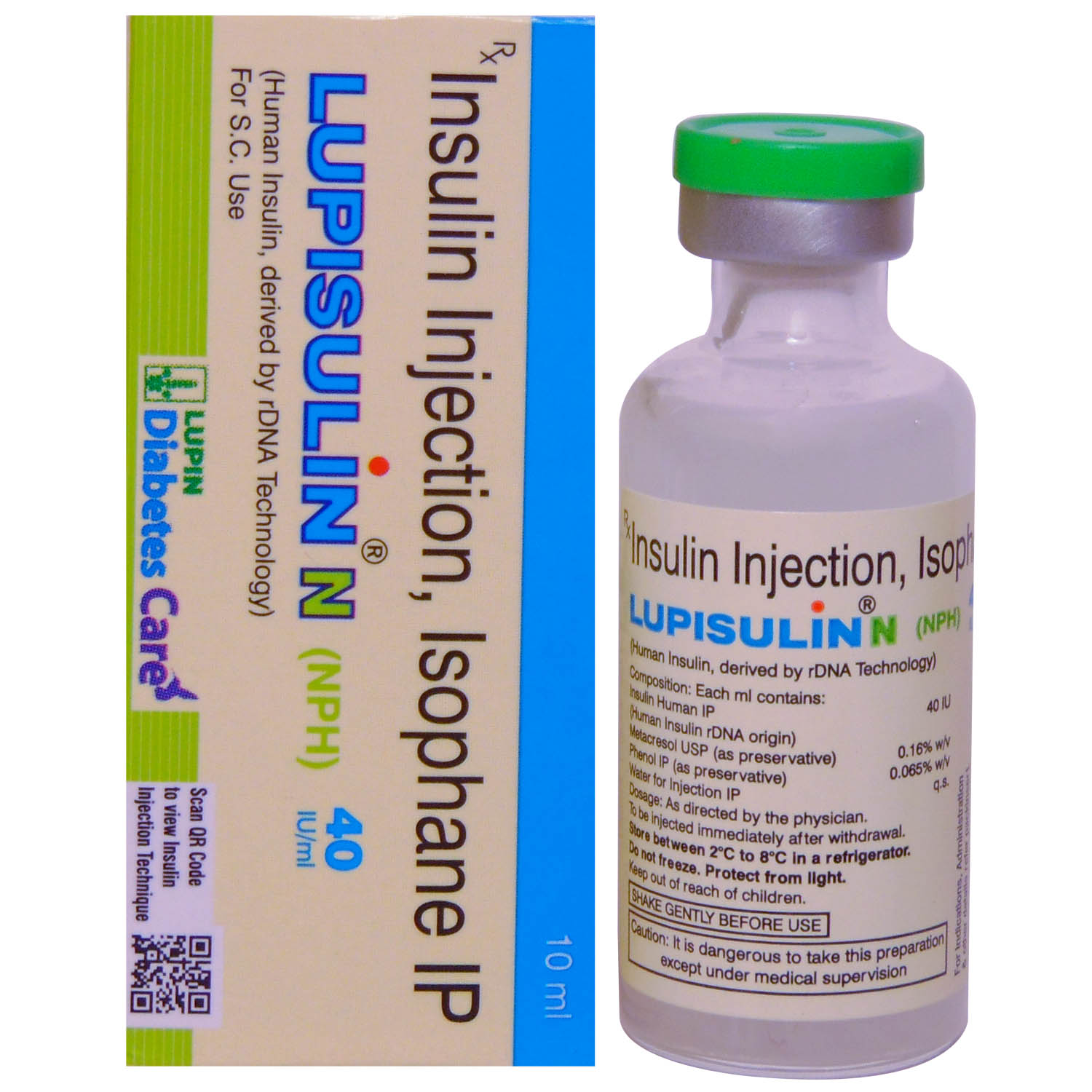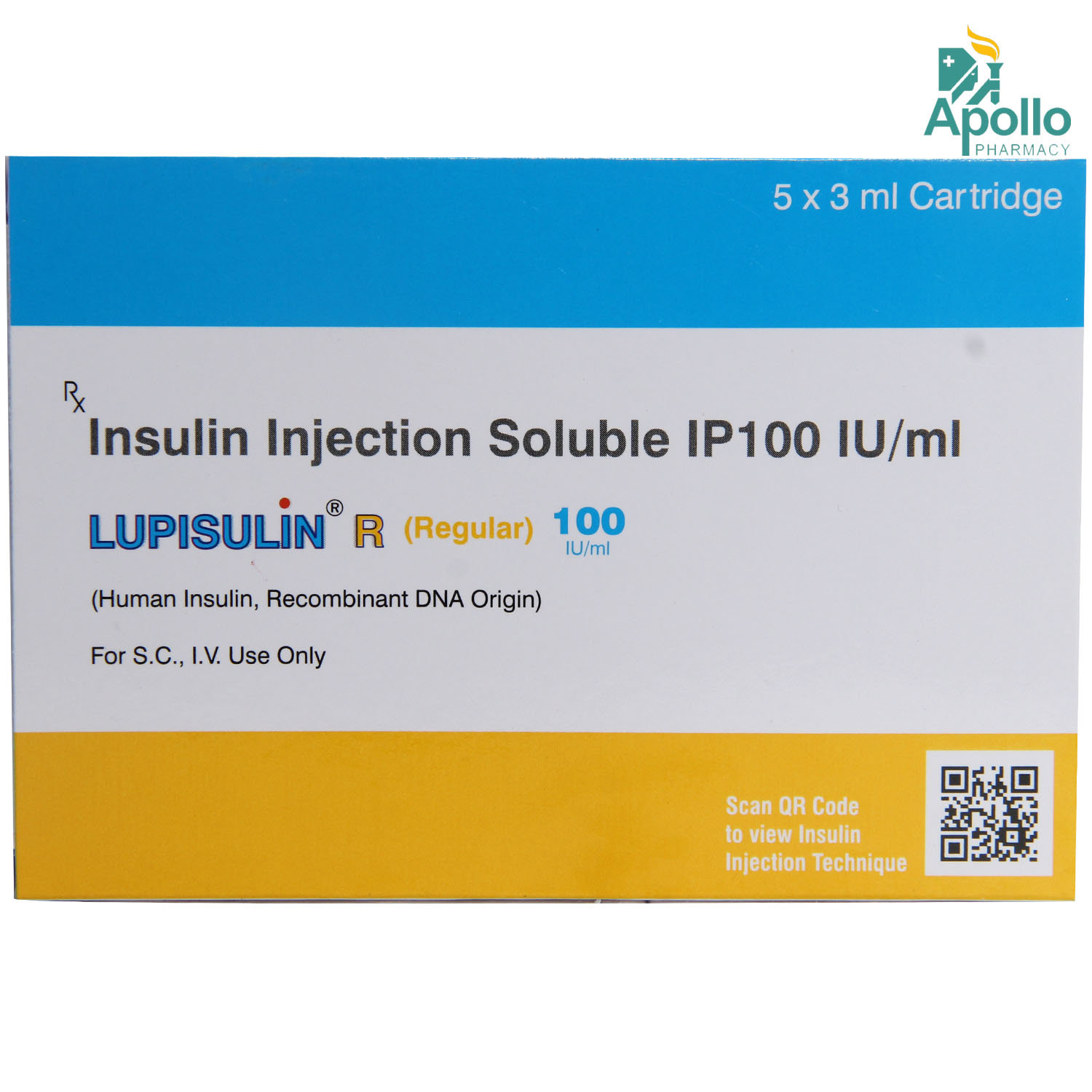Insulin Human
About Insulin Human
Insulin Human is a hormone known as 'insulin' made in your pancreas, which helps your body utilize glucose (sugar) for energy. Human insulin is the name which describes synthetic insulin, which is laboratory grown to mimic the insulin in humans. Insulin Human is a rapid-acting human insulin analogue for the treatment of diabetes mellitus in both children (above two years of age) and adults. When you have diabetes, your pancreas doesn't make any insulin; enough insulin or the insulin it makes doesn't work properly (called insulin resistance). And that's why some people with diabetes are insulin-dependent, which means they need to take it as medication. Taking insulin helps you manage your blood sugar levels.
When Insulin Human is injected, it is extremely fast-acting and works rapidly to normalize blood sugar levels. It typically begins working after 10-20 minutes and will last for between 3 and 5 hours. Due to this short action, Insulin Human should normally be taken in combination with intermediate-acting or long-acting insulin preparations. Insulin Human works by ensuring rapid and consistent sugar control. Insulin Human is a fast-acting form of insulin that helps lower blood sugar levels after food intake. Prevents the risk of having severe complications of diabetes. It stimulates the recovery of sugar in muscle and fat cells and thus suppresses sugar production in the liver.
Your doctor will advise you on how to use Insulin Human. It should be administered at least 5-10 minutes before the meal or within 20 minutes after you start having a meal. The common side effects of Insulin Human are hypokalaemia (low potassium), hypoglycaemia (low blood sugar level), local injection site reactions, lipodystrophy (fat deposition under the skin), rash, and pruritus (itch skin), which may occur at the injection site. Most of these side effects of Insulin Human do not require medical attention and gradually resolve over time. However, if the side effects are persistent, reach out to your doctor.
Try not to stop taking Insulin Human of your own. Let your doctor know about this, as it may cause withdrawal symptoms. Do not take Insulin Human if you have any low blood glucose levels, kidney, liver, or heart problems, or problems with alcohol or other prescription recreational drugs. Along with Insulin Human, you should take a healthy diet, exercise regularly, and maintain weight as your doctor advises. Insulin Human is a cold chain medicine, so it must be stored in the refrigerator between 2-8 degrees Celsius; otherwise, its efficiency might get lost. Do not store it in the freezer of the fridge.
Uses of Insulin Human
Medicinal Benefits
Insulin Human works by ensuring rapid and consistent sugar control. Insulin Human is a fast-acting form of insulin that helps lower blood sugar levels after food intake. Prevents the risk of having severe complications of diabetes. It stimulates the recovery of sugar in muscle and fat cells and thus suppresses sugar production in the liver. Insulin Human helps in improving the glycaemic control, which in turn decreases the risk of progression of complications of diabetes like damage to the retina (retinopathy), damage to the kidney (nephropathy), damage to nerve cells (neuropathy), delayed wound healing, diabetic foot ulcer and others. Besides this, Insulin Human can be safely prescribed to the diabetic mother in the pregnancy and the lactation stage.
Directions for Use
Storage
Side Effects of Insulin Human
- Hypokalaemia (low potassium)
- Hypoglycaemia (low blood sugar level)
- Local injection site reactions
- Lipodystrophy (fat deposition under the skin)
- Rash
- Pruritus (itchy skin)
- Weight gain
- Constipation
- Redness, swelling, and itching at the injection site
Drug Warnings
Insulin Human is for subcutaneous (under the skin) use only. However, some insulin forms can be given intravenously (IV) with a saline solution of 0.9%. If you are changing the brand of insulin or if you need to inject your insulin by another method, it should be done under strict medical supervision. Cases of heart failure were reported when pioglitazone was used with insulin, especially in patients at high risk of cardiac heart failure. The first symptoms of hyperglycaemia (high blood sugar level) may include symptoms like excessive thirst, dry mouth, increased frequency of urination, nausea, vomiting, drowsiness, flushed dry skin, loss of appetite and acetone odour of the breath. You should closely monitor these symptoms. Symptoms like heart failure, weight gain and oedema (fluid deposition in tissue) should not be overruled. It is advisable not to consume alcohol as it may increase or decrease your blood glucose level. Care should be taken while travelling across more than two time zones. Your doctor may adjust your insulin schedule. Insulin Human may decrease the potassium level, leading to a state of hypokalaemia that, if left untreated, may lead to respiratory paralysis, irregular heartbeat rhythm, coma and even death. Do not take Insulin Human if you have any low blood glucose levels, kidney, liver, or heart problems, or problems with alcohol or other prescription recreational drugs.
Drug Interactions
Drug-Drug Interactions: Insulin Human may have an interaction with drugs, including antidiabetic or blood sugar enhancing pills (glucagon, glipizide, metformin, sitagliptin, canagliflozin), blood pressure-lowering medicines (metoprolol, hydrochlorothiazide), bleeding disorder drugs (octreotide), antipsychotic (propoxyphene, phenothiazines), female sex hormones (progestogen, oestrogen), thyroid hormones (levothyroxine), anti-asthmatics (albuterol, epinephrine, terbutaline), an antidepressant (fluoxetine, lithium), lipid-lowering pills (reserpine, niacin, clonidine, fenofibrate, guanethidine), pain killers (aspirin). If you are taking any of the above, speak with your doctor.
Drug-Food Interactions: Insulin Human may interact with an ayurvedic, homoeopathy, Unani, herbal supplements or OTC items. Tell your doctor if you are using these products. Avoid drinking alcoholic beverages with Insulin Human as it may increase or decrease your blood sugar level.
Drug-Disease Interactions: Insulin Human should not be given to patients with kidney disease, liver disease, low blood sugar/glucose level (hypoglycaemia), and low potassium level (hypokalaemia).
Drug-Drug Interactions Checker List:
Safety Advice

Alcohol
unsafeYou are recommended not to consume alcohol along with Insulin Human to avoid unpleasant side-effects. Alcohol may either decrease or increase the blood sugar level which can be fatal.

Pregnancy
safe if prescribedInsulin Human can be used during pregnancy. Your insulin dose may need to be changed during pregnancy and after delivery.

Breast Feeding
safe if prescribedInsulin Human can be given safely to nursing mothers but only under the supervision of a physician.

Driving
unsafeDrive with caution, Insulin Human usually causes drowsiness and affects driving ability. Your ability to concentrate and react may be reduced if you have hypoglycaemia (low blood sugar).

Liver
cautionInsulin Human to be taken with caution, especially if you have a history of liver diseases/conditions. The dose may have to be adjusted by your doctor.

Kidney
cautionInsulin Human to be taken with caution, especially if you have a history of kidney diseases/conditions. The dose may have to be adjusted by your doctor.

Children
safe if prescribedInsulin Human can be given safely to children provided; dose has to be prescribed by a child specialist.
Habit Forming
Diet & Lifestyle Advise
- Exercise may lower your body’s need for insulin during and for some time after the physical activity.
- Exercise may also speed up the effect of an insulin dose, especially if the exercise involves the area of injection site (for example, the leg should not be used for injection just prior to running).
- Discuss with your doctor how you should adjust your insulin regimen to accommodate exercise.
- Avoid eating sugar food and prefer food cooked food low in calories.
- When travelling across more than 2 time zones, you should talk to your doctor concerning adjustments in your insulin schedule.
Special Advise
Your doctor may tell you to have a normal potassium level as prolonged administration causes a life-threatening condition of hypokalemia (low potassium).
Patients Concern
Disease/Condition Glossary
Diabetes: Diabetes is a chronic or lifelong disease that prevents the body from utilizing insulin properly. Insulin is the hormone that controls sugar levels in the blood. Diabetes is a condition in which blood glucose levels are above normal. It is of two types, namely: type-1 and type-2 diabetes. Type-1 diabetes is a condition in which the pancreas produces little or no insulin. Type-2 diabetes affects the way the body processes sugar. Symptoms of diabetes include lack of energy, tiredness, frequent urination, excess thirst, dry mouth, blurry vision, constant hunger, weight loss, and itchy skin.
FAQs
Insulin Human can be given to treat both the condition of type 1 and type 2 diabetes mellitus. However, your doctor will decide whether Insulin Human can be given to you or not depending on your present condition. Insulin Human should be avoided in patients who are allergic to Insulin Human or other forms of insulin, patients with kidney disease, liver disease, low blood sugar/glucose level (hypoglycaemia), and low potassium level (hypokalaemia).
Cold sweat; cool pale skin; headache; rapid heartbeat; feeling sick; feeling very hungry; temporary vision changes; drowsiness; unusual tiredness and weakness; nervousness or tremor; feeling anxious; feeling confused; difficulty in concentrating are some of the common signs of the low blood sugar level in an individual.
If you experience low blood sugar, eat glucose tablets or another high sugar snack (e.g. sweets, biscuits, fruit juice). Measure your blood sugar if possible and rest. Always carry glucose tablets or high sugar snacks with you. You should give a call to any of your family members if you are feeling dizziness or drowsiness.
Local allergic reactions (pain, redness, hives, inflammation, bruising, swelling and itching) at the injection site may occur. These usually disappear after a few weeks of taking your insulin. If they do not disappear, or if they spread throughout your body, talk to your doctor immediately.
Human insulin is a laboratory created by growing insulin proteins within E-coli bacteria (Escherichia coli).


